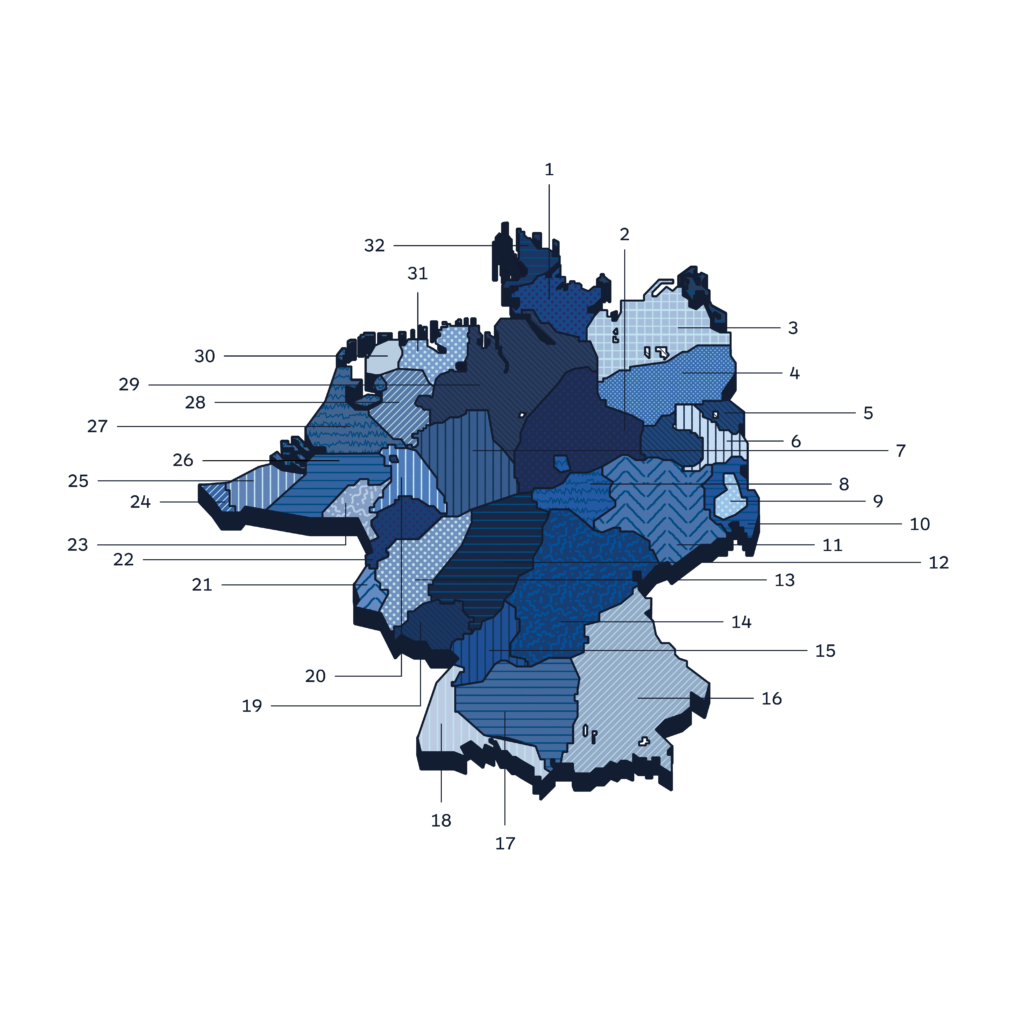Europe
To which language should you translate to localize in the DACH market?
WHAT WE KNOW FROM OUR COMMUNITY
There are many local dialects and regional language variants in the German-speaking market, which comprises a population of 100+ million people. This broad variety is true both within Germany as well as in the larger DACH market, which consists of Germany (“Deutschland”), Austria (“Österreich”), and Switzerland (“Schweiz”). Additionally, there are German-speaking populations in the small states of Liechtenstein and Luxembourg (“Luxemburg”), and in the Italian province of South Tyrol (“Südtirol”). Context therefore matters very much: We always need to consider the specific audience in order to provide natural, idiomatic translations. The safest choice for addressing the entire market is to use Standard High German, a standardized variety of German for communication in formal contexts and between different dialect areas. That said, cultural sensitivity is important, as seemingly simple choices can make quite a difference. For example, a “chair” could be a “Stuhl” for most people in Germany, whereas most Austrians would call it a “Sessel”, which in turn would be a rather specific form of chair (i.e. an armchair) for Germans. Context also matters for grammar and even spelling: A “month” would be “der Monat” (masculine) in Germany but “das Monat” (neuter) in Austria; and “street” would be spelled “Straße” in Germany and Austria but “Strasse” in Switzerland.
To which language should you translate to localize in Germany?
WHAT WE KNOW FROM OUR COMMUNITY
“The average level of English in Germany is B1 in the Common European Framework of Reference.
Among the most English-friendly cities we find Berlin, while the regions that have recorded the worst knowledge of English are those bordering France, in which priority has been given to French as a second mandatory language. The Saarland, in fact, is the Land with the worst result. Berlin is the city who speaks more English, but keep in mind that purchasing power in Berlin ranks among the lowest of any region in Germany. Berliners have to make do with 48% less income than a person living in Munich. Moreover, the further you move away from cosmopolitan areas, the more conservative people are. So make sure your product is fully translated in German and l that your messaging reflect that. An example? In your ads, using the more formal Sie instead of the less formal du can significantly increase conversions.“
LANGUAGE INSIGHT
Official language
German (90.1%; 76.11 mln)
Actual languages
German (90.1%; 76.11 mln), Russian (3.6%; 3.04 mln), Turkish (2.6%; 2.19 mln), Italian (0.7%; 591k), Greek (0.4%; 337k), Polish (0.3%; 253k), other (2.3%; 1.94 mln)
What the top 150 best localized websites in the world do in Germany
(Top 150 websites listed in the Global by Design ranking – published annually by Byte Level Research, this report provides a list of globally localized websites, showcasing best practices and emerging trends in their globalization)
- 136/150 localize by translating into German
- 1/150 localizes by translating into German, French and Simplified Chinese
- 1/150 localizes by translating into German, French, Spanish, Italian and Simplified Chinese
- 1/150 localizes by translating into German, French, Spanish, Italian, Simplified Chinese, Traditional Chinese, Korean, Japanese, Russian and Portuguese
- 1/150 localizes by translating into German, French, Spanish, Italian, Simplified Chinese, Polish, Korean, Japanese, Russian and Portuguese
- 1/150 localizes by translating into German, French, Spanish, Italian, Simplified Chinese, Traditional Chinese, Polish, Japanese, Portuguese, Arabic, Czech, Hungarian, Dutch and Swedish
- 1/150 localizes by translating into German, French, Spanish, Italian, Simplified Chinese, Traditional Chinese, Japanese, Russian, Portuguese, Arabic, Hungarian, Bahasa Indonesia, Romanian, Turkish, Thai and Ukrainian
- 1/150 localizes by translating into German, Low German (Plautdietsch), Romany and German Sign Language
- 1/150 localizes by translating into German, Low German (Plautdietsch) and Palatine German
-
3M
-
ABB
-
Accenture
-
Adidas
-
Adobe
-
Airbnb
-
Aldi
-
Amazon
-
American Airlines
-
American Express
-
Apple
-
Audi
-
Autodesk
-
Avis
-
Bayer
-
BMW
-
Booking.com
-
Bosch
-
British Airways
-
Bumble
-
Burberry
-
BYD
-
Canon
-
Capgemini
-
Cartier
-
Caterpillar
-
Chevrolet
-
Cisco Systems
-
Citibank
-
Coca-Cola
-
Costco
-
Dell
-
Deloitte
-
Delta
-
DHL
-
Disney+
-
Dyson
-
eBay
-
Eli Lilly
-
Emirates
-
Ernst & Young
-
Facebook
-
FedEx
-
Ford
-
Four Seasons
-
Fujifilm
-
GE
-
Gillette
-
GoDaddy
-
Google
-
Gucci
-
Haier
-
Heineken
-
Hermès
-
Hertz
-
Hilton
-
Hisense
-
Hitachi
-
Honda
-
Hotels.com
-
HP
-
HP Enterprise
-
HSBC
-
Huawei
-
Hyatt
-
Hyundai
-
IBM
-
IKEA
-
Intel
-
InterContinental Hotels
-
J&J
-
Jack Daniel's
-
Jehovah’s Witnesses
-
John Deere
-
Kellogg's
-
Kia
-
KPMG
-
L'Oréal
-
Land Rover
-
LEGO
-
Lenovo
-
Lexus
-
LG
-
Louis Vuitton
-
Lululemon
-
LUSH
-
Marriott
-
MasterCard
-
McDonald's
-
Mercedes-Benz
-
Merck
-
Microsoft
-
Mitsubishi Electric
-
Nestlé
-
Netflix
-
Nike
-
Nikon
-
Nintendo
-
Nio
-
Nissan
-
NIVEA
-
Oracle
-
Pampers
-
Panasonic
-
PayPal
-
Pepsi
-
Pfizer
-
Philips
-
Pitney Bowes
-
Porsche
-
Procter & Gamble
-
PWC
-
Revolut
-
Rolex
-
Royal Caribbean
-
Salesforce
-
Samsung
-
Sanofi
-
SAP
-
Sephora
-
Shopify
-
Siemens
-
Sony
-
Spotify
-
Starbucks
-
Steelcase
-
Stripe
-
Subaru
-
Tesla
-
The Church of Jesus Christ of Latter-day Saints
-
Tiffany
-
Tinder
-
Toshiba
-
Toyota
-
TripAdvisor
-
Uber
-
United Airlines
-
UPS
-
Visa
-
Volkswagen
-
Volvo Cars
-
Vrbo
-
Walmart
-
Western Union
-
Wikipedia
-
Wise
-
WordPress
-
Workday
-
Xerox
-
Xiaomi (Mi)
-
Zara
-
Zoom
If you need others information, below you can find a selection of economic/social/cultural data
Overview
Language
Official language
German (90.1%)
T-index
3.5%
T-Index ranks countries according to their potential for online sales.
Other languages
Russian (3.6%), Turkish (2.6%), Italian (0.7%), Greek (0.4%), Polish (0.3%), other (2.3%)
Minority languages: Low German (Plautdietsch), Palatine German, Upper Sorbian, Lower Sorbian, Frisian, Romani, Danish
English
Very high proficiency (EF) – 10 of 111 countries/regions in the world- 8/34 position in Europe.
Demography
Capital: Berlin
Currency: Euro
Population: 84.48 million
Population density: 238/km2
Economy
GDP: 4.08 trillion USD (2022)
GDP per capita: 48.7 milllion USD (2022)
Exports: 1.6 trillion USD (2022)
Statistics
Internet users: 93.3% penetration, 77.70 million
Unemployment rate: 3.1% (2023)
Urbanisation: 78% (2023)
Literacy: 99% (2019)
Conventions
Numbering system
Arabic numerals and comma as decimal separator
Date format: dd-mm-yyyy
Time: 24h time system
Country code: 0049
Language data sources: Worldatlas/Britannica//EF/Wikipedia; Demography data sources: IMF/Worldometers; Conventions data source: Wikipedia; Economy data sources: WTO/OEC/CIA/Esomar/Datareportal; Statistics data sources: Datareportal/WorldBank/UN/UNESCO/CEIC/IMF/Culturalatlas/Commisceoglobal
Facts and data
Economy
Imports
$1.49 trillion (2022). Petroleum Gas ($98B), Cars ($67.7B), Motor vehicles; parts and accessories (8701 to 8705) ($41.7B), Crude Petroleum ($39.5B), and Vaccines, blood, antisera, toxins and cultures ($36B), importing mostly from China ($152B), Netherlands ($131B), Poland ($93.1B), Belgium ($91.9B), and Italy ($78.5B).
In 2022, Germany was the world’s biggest importer of Petroleum Gas ($98B), Nitrogen Heterocyclic Compounds ($19.3B), Reaction and Catalytic Products ($5.42B), Cheese ($5.19B), and Large Flat-Rolled Stainless Steel ($4.95B).
Financial inclusion factors (over 15 years of age)
• 100% have an account with a financial institution
• 56.5% have a credit card
• 81% make online purchases
Ease of doing business
It is very easy to conduct business (rated 79.7 out of 100) ranked 13th out of 44 OECD high income countries and ranked 22nd out of 190 countries worldwide (2022, World Bank).
Exports
$1.6 trillion (2022). Cars ($149B), Packaged Medicaments ($74.8B), Motor vehicles; parts and accessories (8701 to 8705) ($61.8B), Vaccines, blood, antisera, toxins and cultures ($45.5B), and Refined Petroleum ($25.7B), exporting mostly to United States ($153B), France ($120B), China ($109B), Netherlands ($109B), and Italy ($90.7B).
In 2022, Germany was the world’s biggest exporter of Cars ($149B), Packaged Medicaments ($74.8B), Motor vehicles; parts and accessories (8701 to 8705) ($61.8B), Electricity ($18B), and Centrifuges ($15.5B).
Main local online stores
Amazon.de, Otto.dem, Zalando.de
Economic freedom
‘Mostly free’ (72.1 out of 100) ranked 12th out of 44 European countries ranked 18th out of 176 countries worldwide (2024, Heritage Foundation and Wall Street Journal)
Global Innovation Index
Ranked 6th out of 39 European countries, 8th out of 132 worldwide.
The Global Innovation Index captures the innovation
ecosystem performance of 132 economies and tracks the most recent global innovation trends.
Economy data sources: WTO/OEC/CIA/Esomar/Datareportal
Service Imports (2020)
Service Exports (2020)
Source: OEC
Trade balance of goods from 2013 to 2023
Source: Statista
Historical Data Trade Imports
The following section uses historical trade data imports from partners of Germany.
Historical Data Trade Exports
The following section uses historical trade data exports from partners of Germany.
Source: OEC
Germany's Most Complex Exports
The Product Complexity Index (PCI) measures the knowledge intensity of a product by considering the knowledge intensity of its exporters.
Which of the following methods do you prefer to use when you pay for a product you have bought online? (2019)
Source: OEC
Source: PostNord
Perception of products made in selected countries in 2017
Source: Statista
Which attributes do you associate with products made in Germany?
Source: Statista
Germany's Most Specialized Products
Specialization is measured using Revealed Comparative Advantage (RCA), an index that takes the ratio between Germany observed and expected exports in each product.
Source: OEC
No data
Source: Statista
Market Growth Imports (2020)
This score represents the likelihood that the given country will start importing that product in the next few years. It forecasts the opening of a new specific market.
Market Growth Exports (2020)
This score represents the likelihood that the given country will start exporting that product in the next few years. It forecasts the opening of a new specific market.
Source: OEC
Foreign direct investment, net inflows (BoP, current US$)
Source: OEC

T-index
Reach most of the online purchasing power
T-Index ranks countries according to their potential for online sales. It estimates the market share of each country in relation to global e-commerce.
Try it nowMedia
Media language German, English
Information channels
Germany’s competitive television market is the largest in Europe, with more than 38 million TV households. The many regional and national public broadcasters – organised in line with the federal political structure – vie for audiences with powerful commercial operators. Each of the 16 regions regulates its own private and public broadcasting. The national public broadcasters are TV networks Das Erste and ZDF and Deutschlandradio. Public TV and radio are funded by a “broadcasting contribution” paid by each household. Deutsche Welle (DW) is Germany’s international broadcaster. Germany is home to some of the world’s largest media conglomerates, including Bertelsmann and the publisher Axel Springer. The top free-to-air commercial TV networks are operated by RTL Group and ProSiebenSat1 Media. Germans are avid newspaper readers and the non-tabloid press is a trusted news source. There are several national newspapers, but the press is strongest at the regional and local level. Bild tabloid is the best-selling daily. Media freedom is enshrined in the Constitution. While the press and broadcasters are free and independent, the display of swastikas and statements endorsing Nazism are illegal.
The press
Frankfurter Allgemeine Zeitung – prestigious daily
Sueddeutsche Zeitung – Munich-based daily
Die Welt – Berlin-based daily
Frankfurter Rundschau – Frankfurt am Main-based daily
Handelsblatt – Duesseldorf-based financial daily
Focus – weekly news magazine
Der Spiegel – news weekly, English-language site
Die Zeit – weekly
Bild – mass-circulation daily
The Local – Berlin-based, English-language
Television
ARD – organisation of regional public broadcasters; operates Das Erste, the main national public TV channel
ZDF – operates second national public TV channel
n-tv – commercial, rolling-news
Welt – commercial, rolling news
RTL – major commercial broadcaster
ProSiebenSat.1 – major commercial broadcaster
DW-TV – public, international; in German, English, Spanish, Arabic
Sky – pay-TV operator
Radio
ARD – umbrella organisation of public radio services, including those of individual regions
Deutschlandradio – operates national public stations Deutschlandfunk and Deutschlandradio Kultur, both offering current affairs and cultural programmes
Deutsche Welle – international radio, services in many languages
News agency
Media data source: BBC
Internet Data
Internet users
93.3% penetration, 77.70 million
Share of web traffic by device
48.17% mobile phones, 49.71% computers (laptops and desktops), 2.06% tablet devices, others 0.06%
Median speed of mobile Internet connection
57.44 Mbps
Median speed of fixed Internet connection
89.93 Mbps
Mobile connection as a percentage of total population: 145.2%
Percentage of mobile connections that are broadband (3G-5G): 98.7%
Most popular web search engines
Google (89.94%), Bing (5.55%), Yandex (1.26%), Yahoo! (1.07%), Duckduckgo (0.92%), other (1.26%).
Most used social media
Facebook (62.93%), Instagram (16.32%), Pinterest (7.09%), Twitter (5.25%), YouTube (4.03%), LinkedIn (1.7%), Reddit (1.49%), other (1.19%).
Internet data sources: Datareportal/Statcounter
Social statistics
Life expectancy
81 yrs (2022)
Corruption perceptions Index
Germany scored 79 out of 100, ranked 9 out of 180 countries worldwide.
Current health expenditure
12.81% of GDP
Current education expenditure
91.6% of total expenditure in public institutions
CO2 emissions
7.3 metric tons per capita
World Happiness Index
Germany ranked 14 out of 146 countries, with a score of 7.034.
Glass Ceiling Index
54.5 out 100, ranked 22nd out of 29 countries.
The glass-ceiling index measures the environment for working women combining data on higher education, labor-force participation, pay, child-care costs, maternity and paternity rights, business-school applications, and representation in senior jobs.
Social statistics sources: WorldBank/UN/UNESCO/CEIC/IMF
Distribution of employment in Germany in 2019 by economic sector
Source: WorldBank
The Data Factbook is a work in progress project. Our community is helping us to fill it up always with new and updated data. Your contribution is precious. If you want to help us, please write your advices at imminent@translated.com
Country Curiosities
The German language is very special and unique, as some grammatical features can only be found in this modern language. One is the case system; German uses four grammatical cases: nominative, accusative, dative, and genitive. These affect the form of articles, adjectives, and sometimes the nouns themselves. In addition, German nouns have three grammatical genders: masculine (der), feminine (die), and neuter (das). The gender often doesn’t match the actual characteristics of the object, leading to surprises like das Mädchen (the girl, neuter).
Additionally…
- Germany is the largest economy in Europe and the third-largest in the world, with a GDP of approximately $4.2 trillion (2023 estimate).
- Germany is home to over 25,000 castles, ranging from medieval fortresses like Neuschwanstein Castle to Baroque palaces.
- Germany is a pioneer in renewable energy, with more than 59% of its energy coming from renewable sources like wind, solar, and hydroelectric power in 2024.
- Germans are passionate about bread, boasting over 3,200 types of bread.
- German is also known for its extremely long compound words. For example, Donaudampfschiffahrtselektrizitätenhauptbetriebswerkbauunterbeamtengesellschaft (79 letters) is a famous example, though it’s rarely used in everyday language.
- German has a special character, the Eszett (ß), used as a sharp “s” in certain words like Straße (street).
- Germany files over 62,000 patents annually, ranking 4th globally for patent activity (2022).
- OECD deems Germany “Global leader” in Artificial Intelligence. There are more than 40 national and regional state programs to assist AI firms, particularly SMEs, according to the German Foreign Office.
- The German alphabet consists of 26 Latin alphabet letters, plus its characteristic umlauts (ä, ö, and ü).
- Nearly one-third of the country remains forested.
Languages research
Dialects spoken in Germany

Legend
-
1-Holsatian
-
2-Eastphalian
-
3-Pomeranian
-
4-North Margravian
-
5-Central Margravian
-
6-Berlin Dialect
-
7-Westphalian
-
8-Thuringian
-
9-Lowe Siles and Low Rhenish
-
10-Lower Silesian
-
11-Upper Saxon
-
12-Hessian
-
13-Moselle Franconian
-
14-East Franconian
-
15-South Franconian
-
16-North Bavarian
-
17-Swabian
-
18-Low Alemannic
-
19-Rhine Franconian
-
20-Low Rhenish
-
21-Ripuarian
-
22-Luxembourgish
-
23-Limburgish
-
24-Dutch
-
25-Flemish
-
26-Brabantian
-
27-Hollandic
-
28-Dutch Low Saxon
-
29-North Low Saxon
-
30-West Frisian
-
31-Gronings-East Frisian
-
32-Sleswickian
The geographical distribution of languages that you will find in the maps published in this section is a work in progress. Our community is helping us to fill it up with always new and updated data. Your contribution is precious. If you want to help us, please write to imminent.factbook@translated.com
Photo credit: Francesco Luca Labianca , Unsplash


